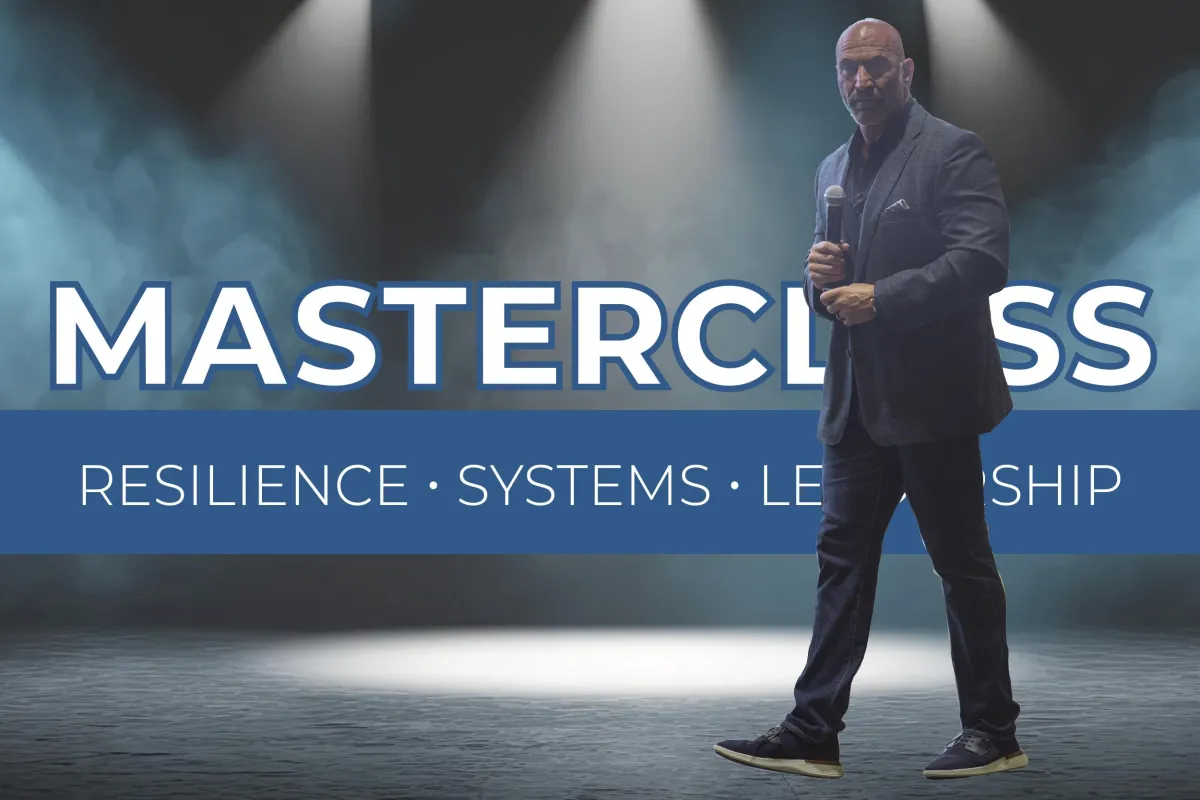
Masterclass in Resilience, Systems & Leadership
From flying commercial jets to building a multimillion-dollar property management company, Steve Rozenberg’s entrepreneurial journey is a masterclass in resilience, systems, and self-leadership.
Steve recently pulled back the curtain on the mindset shifts, painful pivots, and systems that freed him from burnout and made him a magnet for acquisition.

Here is the FREEDOM formula:
1. F - FIND YOUR FOCUS
Steve’s turning point came after a world-alterating event in 2011. In that moment
of making a large pivot, he decided to begin investing in real estate. That
decision led to a clear vision: to build a business that could run without him,
create financial freedom and protect what mattered most.
"I didn’t want to be an option in my business anymore. I wanted to be
irrelevant."
He got crystal clear on what success looked like and what it didn’t. His advice:
“Have a start and an end destination. Most entrepreneurs start
something without knowing when or how they want to finish.”
2. R - RESTRUCTURE FOR SCALABILITY
Steve started out on his own, though early on, he knew he couldn’t scale without
the help of others. He started outsourcing every role that didn’t require a
handshake or a license, including call centers, accounting, and maintenance.
Say Yes! "Outsource anything that doesn’t require a handshake or a license."
His belief? If someone else can do it at 70% of your ability, let them. His
restructuring started with a mindset: “I’m not running a hostage farm."
Team members had roles, metrics, and ownership, not dependency.
He drew a hard line: “You have to set an ‘exit date’ not just for your company, but
for your own tasks. If not, you’ll never be free.”
3. E - ESTABLISH EFFICIENT SYSTEMS
Steve and his business partner, Pete, documented every task with the goal of
removing themselves. That meant SOPs, call scripts, and daily dashboards.
Every role was broken into parts: expectation, measurement, and accountability.
His focus wasn’t perfection, it was repeatability. His key insight: "If your business
can’t be sold, it’s not a business. It’s a job."
By the time he exited, his company could run with minimal input from him.
4. E - EMPOWERMENT THROUGH EMPLOYEES
Steve’s leadership philosophy was built on clarity, not control. He didn’t want
team members asking him questions all day. Instead, he trained them to make
decisions with data, not emotion.
"If your team always needs you, you're not leading."
He partnered with someone who had the operational knowledge of systems and
scalability, while Steve focused on his strengths: growth and sales.
5. D - DEVELOP A GROWTH STRATEGY
Steve’s growth wasn’t accidental. It was engineered. Through dedicated focus, he grew his property management firm to over 1,000
doors under management. He focused on sales and growth, while his partner
focused on systems and operations. Together, they combined their own unique
talents to grow quicker than most companies.
While not intending to sell initially, he and his business partner were approached
for an exit with an irresistible offer signaling that their years of hard effort were
worth it.
6. O - OPTIMIZE FOR PROFITS
Profit came from precision. Every department needs budget constraints, margin
targets, and performance metrics. Steve used benchmarks to optimize pricing,
eliminate waste, and reward profitable behavior.
Steve’s innovative use of virtual assistants in another country helped trim
payroll costs and create a more profitable business. This singular strategy
led to being worth more than other real estate firms because of their profit
margins.
He wasn’t afraid to trim services or say no to unprofitable clients. He made the
hard decisions that most entrepreneurs delay, and that made his business lean,
agile, and lucrative.
7. M - MAKE YOUR EXIT
Steve eventually sold his property management company to a national firm. The
deal didn’t happen by chance, it was the byproduct of years of intentional
systems, recurring revenue and personal irrelevance.
His exit wasn’t just financial. It was emotional and purposeful. It gave him the
time and space to honor his son Jett’s memory through a scholarship fund,
mentor other business owners, and continue speaking on stages around the
world.
"We spend so much time building businesses, we forget to build
memories. That’s what matters most."
Key Takeaways:
● Tell your team: "I’m not an option”
● Set your exit date for your tasks and your company
● Don’t run a hostage farm, create a culture of accountability
● Outsource anything that doesn’t require a handshake or a license
● Build systems like your freedom depends on it because it does
Steve’s story isn’t just about a business exit. It’s a blueprint for building a
business that gives more than it takes, one that lets you live fully, lead deeply,
and leave a legacy that outlives you.
